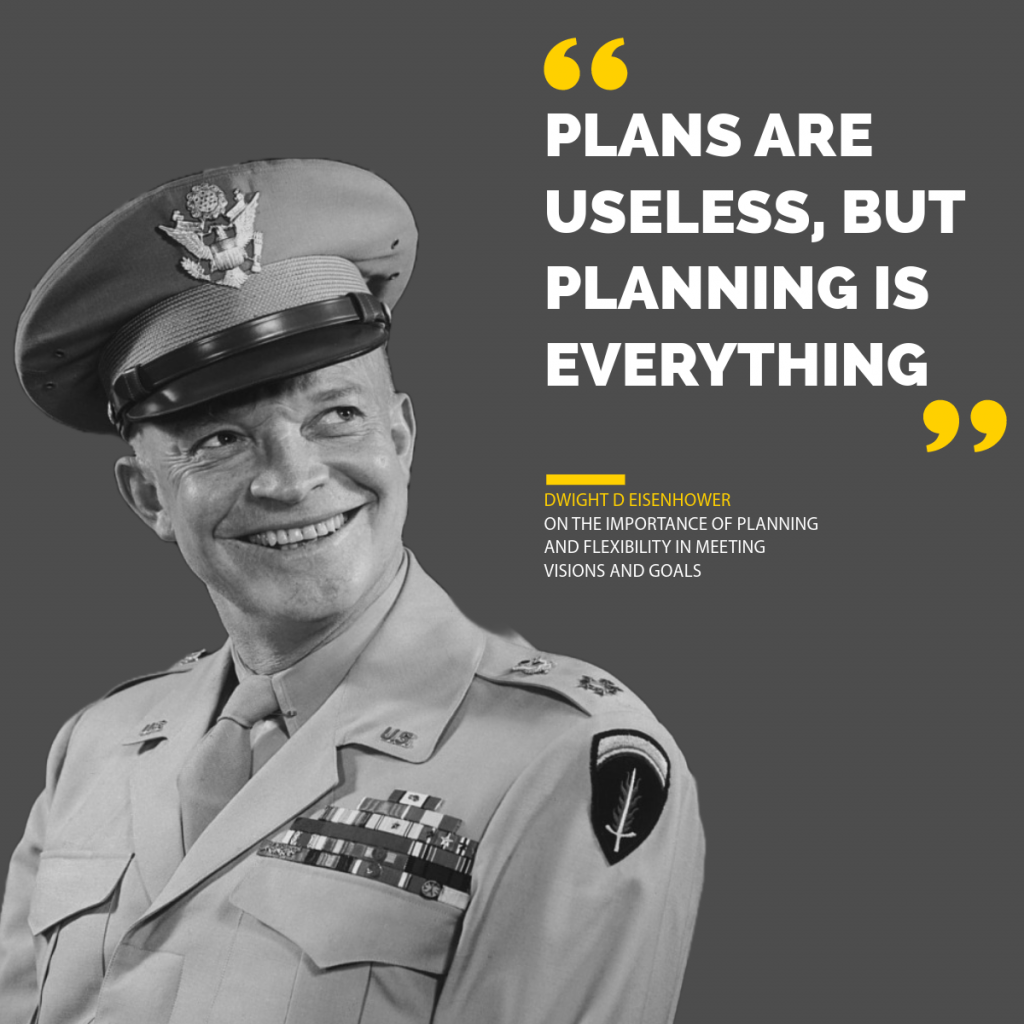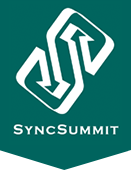
With the New Year arrives new opportunities and challenges, and that’s certainly the case in our world of music for media.
And, as the New Year commences, my question to you, and myself, is twofold: how can we prepare ourselves for the opportunities and challenges in the year ahead, and what is our overall vision and our goals for the year ahead? And how important is planning for the future in an ever-changing world and industry?
I’ll answer this with one of my favorite quotes on planning as stated by US President Dwight D. Eisenhower:
“Plans are useless, but planning is everything.”
At first glance, this quote seems paradoxical, but on reflection it makes a lot of sense and is very useful for mapping out your vision, your goals and the practical steps you need to take to reach your goals.
The point Eisenhower was making is that almost all plans will go awry or need to change from the initial script, rendering almost any plan in its initial form as a rigid roadmap towards a goal worthless.
But, without a game-plan to realize your goal and how you plan to reach that goal, you’ll be unprepared to meet the challenges and the opportunities that you’ll face in realizing your goal in the year ahead.
So planning is everything, but rigidly sticking to a plan in the face of change and not adjusting your plan to challenges and opportunities happening in real time is a recipe for failure.
Planning allows us to not only define our goals and how we plan to reach it, planning also help us to organize resources, explore options, contingencies and to build a foundation for action that gives us the latitude and ability to respond to real-time changes in order to reach our goals and objectives.
These are the reasons I think it is crucial that everyone aiming for success in music and in life in general takes some time at the beginning of the year to think about their goals for the next 12 months, then works to formulate a plan for reaching those goals.
In my planning, I like to start off by zooming out to the highest level I can and then zoom into specific things I can do to reach my overarching goals.
For example, let’s say my goal is to have 100 songs licensed this year, and five of those songs licensed for at least $100,000 per song. This gives me an overarching vision for the year ahead. I like to set big goals for myself – it’s just as easy to set a big goal as a small one, and then formulate a plan that provides me the best chance to make my goal a reality.
The next step is planning on how to get to that goal. Here’s some starting points I would think about in my planning to reach the goal I stated above:
- Work to better your creative craft: Invest in, as you can, learning the skills to mix and master your music properly or if you have the financial ability, hire experts to help you. Find like-minded creative minds to collaborate and create with on your work.
- Define the markets you want to work with: Do you want to work with all areas of media, or focus your efforts just on film/TV or ads, or Trailers or Sports? Do you want to work internationally? Just in the USA? Think about this, and then let your decision on what areas you most want to work in help define where you focus your planning and goals.
- Research who you would like to work with and what kinds of projects you want to work on: Use LinkedIn, IMDB, social media (esp. Instagram, Facebook), Tunefind, iSpot and Google searches to learn who are the decision makers behind the media and the projects you could envision working with your music. Research decision makers – music supervisors of course, but also coordinators, editors, creative officers at agencies, brand managers and hears of music departments at studios to name just a few of the kinds of people you can work with.
- Invest in building your network: Find opportunities online and in person to meet decision makers in the industry. Become a Friend of the Guild Of Music Supervisors, Attend GMS events, attend a Sync Summit, attend our webinars, attend other sync-related events, join our community, attend film festivals, game events, listening sessions, ad industry evens. These combine resources give you access to literally thousands of people who can help you, that you can collaborate with and you can learn from.
- Contact decision makers in a polite, persistent manner. Once you’ve done your research on who you want to contact, or even better, you have made some contacts from networking, build out a brief, personalized letter of introduction (one that can work as a DM too) along with a sample playlist of 3-5 MP3s with links that don’t expire and allow both downloading and streaming. Then, wait 5-6 weeks before sending a new, brief follow up message, which should be a new message with links to your music, including 1-2 new songs if you have anything you wish to share.
- Learn the fundamentals of the music in media business. Take one of our courses for a deep dive into the keys for success in the world of music licensing and making music for Ads, brands, games, sports, trailers, film, TV and interactive platforms and the industry in general. This a complicated business, and getting first-hand advice and tools from industry experts and music supervisors working in the field can make the difference in succeeding in this industry. And beyond us, use Google to research other resources to help you get the information you need to assist with your building your music in media business.
- Find a sync agent, a library a label or a publisher who’s network you can leverage to promote and license your music to their network. Companies and people that work directly with music supervisors, coordinators, ad agencies, studios, and brands to create and license music for their projects have built deep relationships with key decision makers that you can leverage to greatly increase the chances of your music being heard and getting used in a project. We created a Sync Agent Directory in 2020, which we’re updating for a 2024 to help you find a sync agent. And, beyond the directory, research agencies online, see what projects they’ve worked on, and contact them to present to them 3-5 songs of your music until you find a sync agent that you feel comfortable working with.
- Leverage technology to help you with your outreach and in finding ways of exposing your music to industry decision makers. Smart utilization of technology is key to your success in the world of making and licensing music for media. Cloud-based storage and organizational solutions like Disco and Bridge Audio really help you to organize and present your music in the most professional manner possible, I believe they are essential and everyone should use them. Additionally, there are a host of tools that can help present your music to a wider audience of potential projects and decision makers like MDIIO, Surf and many others. This quick list is just scratching the surface of technologies that can help you to do your work more effectively and efficiently.
Those are my main points of the resources I would use to meet my main goal of 100 syncs and five syncs over $100,000 in 2024. Next, I would then take the basic ways and means that I mapped out above, and then break them down into a series of goals based on weekly, monthly and quarterly milestones and timelines throughout the year.
Now, once I have all this planning together, it’s time to put in the work. Get the work started on all the points I’ve listed based on priority, timeline and milestone and focus on my goals – and when facts on the ground change – like when a sector of the industry stops production like the film/TV industry did last year, I then pivot efforts and adapt my plan to consider the current market realities.
For example, the Screen Actors Guild strike is over. What does this mean time me in my efforts?
It means there are about to be a great deal more music creation and licensing opportunities available from the studios, networks and TV/film music supervisors because the production of films and services is about to increase exponentially for the first two quarters of 2024.
And, knowing this, you may want to shift additional time and resources to finding ways to research, connect with and present your music to the decision makers in TV/Film to take advantage of the opportunities coming up in 2024, and to make connections and learn specifics about the Film/TV world through our Sync Course starting on January 7th with leading TV/Film Music Supervisor Chris Mollere.
Whatever your vision for the year ahead, I hope that in the New Year, Sync Summit can help you realize your vision and goals for 2024.
To kick off 2024, come join us if you can for our talk tomorrow, January 1, 2024 at 3PM ET on wellness and defining your 2024 vision and goals with Wisdom Of Morrie Author/Editor Rob Schwartz. It’s going to be fun, free and a great way to jumpstart your vision for 2024.
Best,
Mark Frieser
CEO, Sync Summit

